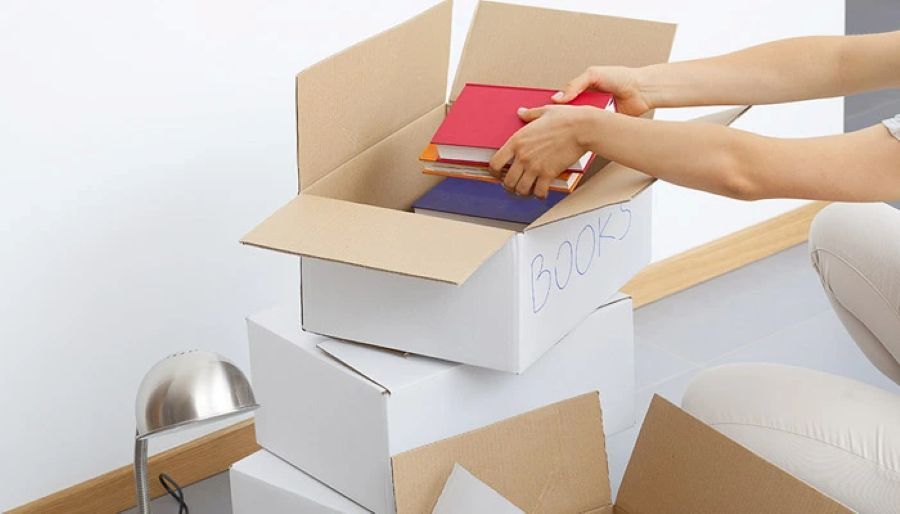Moving Checklist for Couples Buying Their First Home
Moving into your first home together as a couple is exciting, but it also needs careful planning and teamwork. With62% of recent homebuyers being married couples and 18% being unmarried couples, you're joining millions of other couples taking this big step together each year.
Getting Ready Together: The Planning Phase
Talk About Money First
Before you start packing boxes, sit down and have an honest chat about money. Moving costs more than most couples expect. In 2024, the average move cost $2,050, with 78% of people facing surprise expenses they didn't plan for.
Here's what you need to discuss:
Your Moving Budget
- How much can you both spend on the move?
- Who pays for what?
- Do you have money saved for surprise costs?
Current Financial Picture
- What debts do you each have?
- How much savings can you use for the move?
- Will you need family help or loans?
First-time homebuyers often feel money stress. Thetypical first-time buyer is now 35 years old, and many spend 24% of their income on housing costs. Planning your move budget together helps avoid fights later.
Set Your Moving Timeline
Most couples need 8-12 weeks to plan their move properly. Here's a simple timeline that works:
10-12 Weeks Before Moving
- Get quotes from at least 3local movers
- Researchpacking services if needed
- Start decluttering your stuff together
- Create a shared moving binder or digital folder
8-10 Weeks Before
- Book your moving company
- Start collecting moving supplies
- Begin packing non-essential items
- Research your new neighborhood together
4-6 Weeks Before
- Confirm utility transfers
- Submit change of address forms
- Start using up food in your fridges
- Pack seasonal items
2-3 Weeks Before
- Confirm all arrangements with movers
- Pack everything except essentials
- Prepare your first-day survival kit
- Double-check your timeline
Before You Move: Essential Tasks for Couples
Handle Your Utilities Like a Team
Setting up utilities in your new home takes time. Most utility companies need 2-3 weeks notice, so don't wait until the last minute. The Federal Trade Commission recommends setting up utilities in advance to avoid service delays.
Utilities to Set Up
- Electricity and gas
- Water and sewer
- Internet and cable
- Trash and recycling
- Security system (if wanted)
Split these tasks between you. One person can handle electric and gas while the other deals with internet and trash service. This saves time and makes sure nothing gets forgotten.
Create Your Moving Day Survival Kit
Pack a box with everything you'll need for your first 24 hours in your new home. Include:
Basic Needs
- Toilet paper (this is super important!)
- Paper towels and tissues
- Phone chargers
- Snacks and water bottles
- Basic first aid supplies
- Flashlight with batteries
Comfort Items
- Change of clothes for both of you
- Toiletries and medications
- Blankets and pillows
- Coffee or tea supplies
- Your favorite takeout menus
Important Documents
- Moving contracts and receipts
- New home paperwork
- Insurance documents
- ID and credit cards
- Emergency contact list
Your Moving Day Game Plan
Assign Roles and Stick to Them
Moving day works better when each person has clear jobs. Here's how to divide tasks:
Person A Can Handle:
- Directing movers and checking inventory
- Handling payments and paperwork
- Coordinating with utility companies
- Managing the moving day timeline
Person B Can Handle:
- Packing last-minute items
- Cleaning the old place
- Handling pets or kids
- Managing food and drinks for everyone
Together You Should:
- Do a final walk-through of your old home
- Check that movers handle fragile items carefully
- Take photos of any damage
- Celebrate when it's done!
Expect Some Stress (And Plan for It)
About 82% of people who moved in 2024 said it was stressful, with 42% saying the process brought them to tears. This is normal! Moving isone of life's most stressful events, right up there with getting married or starting a new job.
Ways to Handle Moving Stress:
- Take breaks when you need them
- Keep your sense of humor
- Remember you're a team
- Order pizza instead of cooking
- Plan something fun for after the move
Setting Up Your New Home Together
Unpack Smart, Not Fast
Don't try to unpack everything in one day. You'll burn out and probably argue. Instead, unpack in this order:
First Day:
- Bathroom essentials
- Bedroom basics (bed, sheets, pillows)
- Kitchen must-haves (coffee maker, plates, cups)
- Important documents and medications
First Week:
- Clothes for work and daily life
- Basic cooking supplies
- Cleaning supplies
- Electronics and entertainment
First Month:
- Decorative items
- Books and hobby supplies
- Seasonal items
- Extra furniture and storage
Make It Feel Like Home
Your new house becomes a home when you both add personal touches. Here are some ideas:
Quick Ways to Feel Settled:
- Hang up some favorite photos
- Put plants in windows
- Set up a cozy spot to relax together
- Display items that make you both happy
- Cook your first meal together in the new kitchen
Managing Money During Your Move
Typical Moving Costs for Couples
Understanding real costs helps you budget better. Here's what couples typically spend:
Local Moves (Under 100 Miles):
- Professional movers: $880-$2,570
- DIY truck rental: $150-$500
- Packing services: $280-$2,200
- Moving supplies: $150-$300
Long-Distance Moves (Over 100 Miles):
- Professional movers: $2,700-$10,000
- Moving containers: $900-$4,500
- Truck rental: $1,500-$4,000
- Gas and travel costs: $500-$1,500
Ways to Save Money Together
Before You Move:
- Get quotes from multiple companies
- Move during off-peak times (winter, weekdays)
- Sell items you don't need
- Use free boxes from liquor stores and grocery stores
During Your Move:
- Pack most items yourself
- Disassemble furniture ahead of time
- Move small items in your car
- Keep inventory to avoid lost items
After Your Move:
- Shop secondhand for furniture you need
- Buy essentials first, nice-to-haves later
- Check for first-time homeowner discounts
- Look into utility company rebates
First-Time Homeowner Tasks
Safety First in Your New Home
Your safety is the most important thing. Do these tasks right away:
Immediate Safety Steps:
- Change all door locks
- Test smoke and carbon monoxide detectors
- Find the circuit breaker and water shut-off valves
- Check that doors and windows lock properly
- Install new batteries in all safety devices
TheNational Fire Protection Association reports that smoke alarms cut the risk of dying in a home fire in half, yet 40% of home fire deaths happen in homes with no smoke alarms.
Within Your First Week:
- Meet your neighbors
- Find the nearest hospital and fire station
- Learn your home's quirks and systems
- Set up basic emergency supplies
- Register with local emergency services
Get to Know Your New Home
Take time to understand how your home works. This prevents problems later and helps you feel more comfortable.
Important Things to Find:
- Main water shut-off valve
- Electrical panel/circuit breaker
- HVAC system and filters
- Emergency exits from each room
- Outdoor spigots and electrical outlets
Working as a Team Throughout the Process
Communication Tips That Work
Moving together tests your relationship, but it can also make you stronger. Here's how to stay connected:
Before Major Decisions:
- Talk about your priorities
- Listen to each other's concerns
- Compromise when you disagree
- Remember you're on the same team
During Stressful Moments:
- Take breaks when tension rises
- Use "I" statements instead of "you" statements
- Focus on solving problems, not blaming
- Celebrate small wins together
Planning for Your Future Together
Think about your long-term goals as you settle in. This helps you make better decisions about your new home.
Questions to Discuss:
- How long do you plan to live in this home?
- What changes might you want to make?
- How will you handle maintenance and repairs?
- What are your next big goals as a couple?
Common Mistakes to Avoid
Don't Skip These Important Steps
Before Moving:
- Don't assume utilities will be ready
- Don't forget to update your address with banks
- Don't pack everything without labeling boxes
- Don't book movers at the last minute
During Moving:
- Don't leave valuables unattended
- Don't forget to keep important documents with you
- Don't assume all your stuff will fit in the new place
- Don't try to do everything yourself
After Moving:
- Don't ignore safety issues
- Don't buy everything new at once
- Don't forget to register to vote in your new area
- Don't stress about making everything perfect right away
Your First Month in Your New Home
Getting Settled Together
The first month is all about making your house feel like home. Take your time and enjoy the process.
Week 1: Basics
- Unpack essentials
- Set up utilities
- Find grocery stores and restaurants
- Take care of safety items
Week 2: Comfort
- Organize your main living spaces
- Set up your bedroom properly
- Get your kitchen working well
- Start meeting neighbors
Week 3: Routine
- Establish daily routines
- Find local services (doctors, dentists, etc.)
- Explore your neighborhood
- Start thinking about decorating
Week 4: Personalization
- Add decorative touches
- Hang pictures and artwork
- Set up hobby spaces
- Plan your first dinner party
Building Your Life Together
Moving in together is about more than just sharing space. It's about building a life as a team.
Important Conversations to Have:
- How do you want to share household tasks?
- What traditions do you want to start?
- How will you handle different habits and preferences?
- What are your dreams for this home?
Consider working with professionalEdmonton movers who understand local moves if you're relocating in the Alberta area. They can help make your transition smoother and less stressful.
Final Thoughts
Moving into your first home together is a big step, but it doesn't have to be overwhelming. With good planning, clear communication, and teamwork, you can make it a positive experience that strengthens your relationship.
Remember that every couple's move is different. Some things will go perfectly, others might be challenging, and that's completely normal. The key is to stay flexible, help each other, and keep your sense of humor.
Take your time getting settled. It usually takes 3-6 months to feel truly at home in a new place. Be patient with yourselves and each other as you adjust to your new life together.
Your first home together is just the beginning of your shared journey. Enjoy this exciting time, celebrate your accomplishments, and look forward to all the memories you'll make in your new space.
Ready to start your move? Having a solid plan makes all the difference between a stressful experience and an exciting new chapter in your life together. Welcome to your new home!



